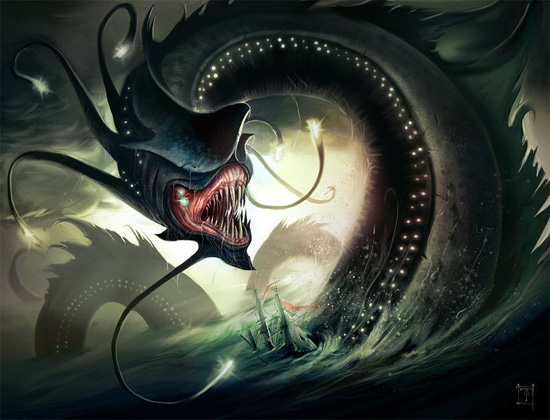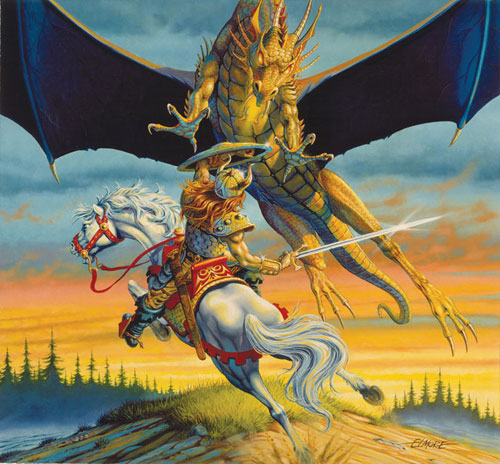
| Home | F.A.Q.s | Theatrical View | Images Of Dragons | Bibliography |


Legend is a type of folk narrative. In some ways, legends resemble myths. But myths typically relate events from a remote time long ago and deal with such religious subjects as gods and goddesses and the origin of the universe. Legends are set in the present or in the historical past. Although legends may have religious implications, most are not religious in nature. Legends distort the truth, but they are based on real people or events.

Every society produces legends. They constitute an unofficial or folk history by reflecting the attitudes and values of the group that creates them. In addition, legend heroes possess exaggerated attributes--positive or negative--of special significance to a society. For exemple, many legends tell about dragons to be a representation of evil while holy Knights (or Paladins) represented pure righteousness. Such legends emphasized the courage and fairness of these legendary heroes and keep people in the path of good.
The majority of societies have both local and national legends. Local legends tell about heroes of a particular ethnic group, occupation, or region. For example, John Henry is a legendary hero of African Americans, and Casey Jones has the same rank among railroad engineers. National legends are shared by an entire people. Many British men, women, and children take pride in the achievements described in the tales of King Arthur and his Knights of the Round Table. Urban legends are an increasingly common form of folk narrative. They reflect the anxieties of modern urban living.
In all of the English language, Beowulf is one of the longest and greatest poems written. It is an epic poem consisting of 3182 lines of alliterative verse. The poem is about the hero Beowulf and his battles with Grendal, Grendal’s mother and finally a dragon. In the beginning, Beowulf travels from his home in Geats to Denmark to help the king of Danes, Hrothgar. Grendal, a fearsome monster, plagued the king’s great hall. Beowulf wounds Grendal who flees and goes to his cave to die. The next night, Grendal’s mother comes to the great hall and kills one of Hrothgar’s men to avenge her son. Beowulf tracks her down into her lair and kills her. When he returns to the great hall, he is rewarded with many gifts and great honors.
He returns home to Geats and rules there for fifty years in peace. A dragon begins to terrorize his land when some of its treasure is stolen. The first time Beowulf attacks the dragon with his servants, they are unsuccessful. He decides it is best to track the dragon to its lair and attack it then. All of his servants are dead or ran away. The only one left to help him is his kinsman, Wiglaf. Beowulf defeats the dragon, but is mortally wounded. He is buried by the sea in a burial mound with the dragon’s treasure.

The only known written copy was written around 1000 AD. Historians believe the poem was first created as early as 700 AD and passed down orally for many years before it was written in its current form. It originally had no title but in the 19th century, people began referring to the poem by the name of the hero in it. There are two styles of handwriting in the manuscript suggesting two separate people wrote it. It is thought that the poem was originally created as an elegy, a mournful poem, for a king who died at some time in the 7th century. Who this king was is unknown to this day.
The first documented owner of the manuscript was the 16th century scholar Lawrence Nowell. In the 17th century, a man named Robert Bruce Cotton acquired it for his collection. The manuscript containing Beowulf can be called either the Nowell Codex or Cotton Vitellius A. xv in reference to the two men that owned it. In 1731, it was irreparably damaged in a fire that tore through a building that housed other medieval manuscripts in Robert Bruce Cotton’s collection.
In 1818, an Icelandic scholar named Grimur Jonsson Thorkelin, created the first transcription of the epic poem. This record of the poem was highly prized, but the accuracy of it was called into question since the original had decayed further over the years. In 1845, an attempt to preserve the manuscript was made. The pages were mounted in special paper frames to prevent further damage. The pages were protected but letters near the edges were covered. In 1993, the British Library started the Electronic Beowulf project. They used special lighting techniques apply infrared and ultraviolet lights to reveal the covered letters.
Two scribes transcribed the Beowulf manuscript that exists today from an original. The style of handwriting is consistent from the start of the manuscript until line 1939, after which the handwriting changes to another for the rest of the poem. Both pagan and folkloric aspects as well as indisputable Christian tones are found in Beowulf. This duality of symbols in the poem has led some to think that there were at least two authors of the original poem. Others speculate that as the poem was told and retold over time it picked up Christian themes as Christianity spread over Europe. Given the age and condition of the original manuscript as well as the two separate handwriting styles and lack of information about the original author, it is impossible to know for sure.
Although this advice had seemed quite bizarre, the queen had been so aroused by the chance it offered her that she had rushed away, ignoring the voice of the soothsayer calling after her. Arriving back home, the queen had ordered two crisp onions to be brought to her at once.
The queen was so excited by the promise the onions held that she ate the first one without stopping even to peel the skin from it. Not surprisingly, it tasted disgusting and so, in spite of her enthusiasm, she spend time carefully peeling the second one, stripping away every layer of skin before eating it. Nine months had passed since then, and now, precisely as foretold by the soothsayer, her greatly desired sons were about to be born.
Outside the royal bedchamber, the courtiers and the palace staff were eagerly awaiting the official announcement of the birth of the new princes. Suddenly, an ear-splitting scream echoed within the chamber. But it was not the lusty cry of a newborn baby; it was, instead, a shriek of horror, a wail that sprang from the throat of the royal midwife when she set eyes upon the queen's first child. It was a male - but it was not human.
The queen had given birth to a lindorm, a hideous, snakelike dragon, whose wingless body thrashed upon the marble floor in scaly coils, and from whose shoulders sprang a pair of powerful limbs with taloned feet. So repulsed by the creature that she was unable even to whisper, let alone scream, the queen leaned down, took the young lindorm in her hands and hurled it through the window into the dense forest surrounding the palace. Weakened from the exertion, the queen sank back upon the bed and gave birth again, this time to a perfect healthy, fresh-faced boy, with golden hair and sparkling blue eyes.

Years passed, and the boy became a youthful prince in search of a bride, but what he found was his brother, the lindorm. The prince was riding around the edge of the vast forest encompassing the palace when, without warning, a huge head emerged from a thorny bush directly in front of him. Rearing up until its green-scaled body resembled a towering tree, the lindorm gazed down at the youth with unblinking amber eyes that penetrated his innermost thoughts. And as the prince stared back, mesmerized and motionless, he heard its voice assuring him with cold, reptilian detachment and certainty that he would never find a wife until he, the elder brother, had obtained the true love of a willing bride.
Accordingly, over the next few months a succession of village maidens was given to the lindorm in the hope of overcoming this barrier to the young prince's quest for a bride. Needless to say, none of the maidens came willingly, however, and so none was accepted by the monster. The situation seemed irredeemable, until the next maiden selected to be the bride of the lindorm had the good fortune to encounter the same soothsayer whom the queen had consulted so many years before. After listening while the maiden spoke of her impending plight, the soothsayer whispered into her ear a few words that swiftly replaced her sadness with a smile of delight.
That night, the maiden was presented to the lindorm, who gruffly told her to take off her dresses, of which she seemed to be wearing a surprising number. She agreed to do this, but only after extracting from the lindorm the promise that for every dress she took off, it would shed a layer of skin. This it did, until only one remained, and until the maiden was clothed in just a single simple garment
Despite remembering the soothsayer's words, it was not without nervousness that she removed this final gown and stood naked before the great dragon. The lindorm moved toward her, and the maiden tensed - fearing, yet also desiring, what was to come, for if the soothsayer had spoken truthfully there would be great happiness and great love ahead. And so she stood erect and motionless as the serpentine monster leisurely, almost tenderly, enveloped her body in its scaly coils. She had expected them to feel cold and slimy, but was pleasantly surprised by their warmth and softness when they embraced and caressed her. Even so, she felt a flicker of terror rising within her and desire to flee. Then the words of the soothsayer came back into her mind, calming her, and she relaxed again.
Gazing about, she noticed that the lindorm's last layer of skin, so thin as to be almost translucent, was starting to peel away, folding back upon itself like a cluster of withered leaves. At the same time, a strange green mist manifested itself, enveloping the lindorm, until she was aware of its presence only by the embrace of its sinuous body. Gradually the mist dispersed and revealed that she was no longer wrapped within the serpentine coils of a lindorm, but held in the firm arms of the most handsome man she had ever seen.
The soothsayer had indeed spoken truthfully. By following her instructions, the maiden had dispelled the enchantment that had incarcerated him within the body of a lindorm, and here was the elder prince, heir to the throne, for whom she would certainly be a willing bride.
The joyful marriage took place without delay, and after the old queen had given her blessing to the newlyweds, now the king and queen, she felt a light tap on her shoulder. It was the sootsayer, who revealed the information the queen had not stayed to hear all those years ago—to be sure to peel both onions before eating them.
TOP
At the falling night, he noted that he had been mislaid. He scanned the darkness in the hope to see the campfire of some hunter or the hut of a coalman. The branches lacerated his face while he advanced in the obscure forest, and sudden it seemed to him that the ground was falling under his steps. He released the leading-rein of his mule, tried to advance, lost foot and fell at the bottom from a ravine, bringing in his fall several roots and stones. At the bottom, the ground was covered with mud and the air impregnated of a strong odor of manure and burned foliage. Exhausted, the cooper shrivelled in a corner and fell asleep.
With the pale gleam of the dawn, he woke up, sored all over, and contemplated the thin band of sky which cut out between the walls of the ravine, so high and abrupt that he could not think of climbing them, and he sank in a deep despair. Then he heard the sigh of a drowsy animal, so near and so powerful that he felt his hair to straigt up on his head. This breath was hot like the breath of a furnace and passably sulfurous. It seemed to emanate on the side opposite of the ravine and the cooper leaned ahead and scanned the darkness. In a jump, he stand erected. Not far from him, their folded up rings and their massive forms cutting out vaguely in the dim light, their heavy half closed eyelids because the winter torpor, two enormous dragons were rested.
Our man fell to knees to beg the sky. At this time there, one of the dragons emerged from its torpor. The wings folded up like a fan, it came out of the cave in a great unfolding of scaly rings, carried by four short clawed legs. It agitated the tail in direction of the cooper and it was rolled up around him. The dragon looked a few moments at the prisoner with glaucous eyes, then released him and re-entered in its den, leaving poor man with his knees trembling of terror, but unharmed.

Knowing his rescue improbable and his escape impossible, the cooper spent the winter in the ravine, accompanied by the drowsy dragons. He nourished from mushrooms growing on the wet walls, heated by the breath of the dragons, and was refreshed by collecting the dew in his hands. As he was left in peace, he lost his fear and, one night when the snowflakes fell thick and where cold bit him, he slipped into the cave and settled himself well at the heat from the hollow of the rings. One of the dragons turned the head but, accepting the intrusion, it took again its position and left him quiet.
The cooper thus spent the night and all those which followed and, with the return of spring, when the melting made waters cascade in the ravine, the dragons saved his life. One morning, he woke up alone and frozen in the smoked den. He heard the sound of the beating of large wings. He went outside and saw one of the dragons spreading its membranous wings and, whipping the air from its tail, rising in the sky. The other dragon was also on the point of flying away in the bright light of the morning and it slowly unfolded its wings. The cooper seized it by the tail and he hung on with all his strength while the animal rose off the ground and into the sky.
Arriving at the edge of the ravine, the man released his grip and fell gently on the ground. He looked for a moment upon the rise of the dragons in the luminous sky. Then, he found the path from which he had deviated the preceding autumn and followed it until he reached his home. There, he told his adventure to his friends and relatives, who were amazed. They thought he was dead since his mule had returned alone, several months before.
TOP
On one occasion, the winner was an unknown and very handsome young man, who refuse to give his name or say where he came from, despite the entreaties of Eleanor herself. The aura of mystery surrounding the anonymous troubadour, together with his kindness and beauty, soon made him one of the favorites among the ladies of the court. Griselda, a young and wistful maiden, the youngest daughter of the lord of Foix, fell passionately in love with the knight and declared fer love for him. Moved by the maiden's entreaties, the troubadour agreed to marry her in secret and take her to his home, but on condition that Griselda should never try to see him other than when he chose, and that she should never try to discover his secret.
The lovesick lady promised to comply with this strange condition. It seemed little to ask in exchange for being able to remain with her loved one.
One night, the young Griselda had fallen asleep in the arms of her lover in the castle of Eleanor of Aquitaine where she lived, and on opening her eyes she found herself in an unfamiliar room. It was luxurious place, adorned with silk and precious stones, and beside her lay her husband smiling benignly at her.
"You are in my house, which belongs to you," said the troubadour. "You may give orders to my servants and do whatever you please. There are stables with horses at your disposal, huntsmen and hawks for hunting, and you may go as you wish. You are my lady, and all that is mine is yours. There are maidens ready to serve you and to carry out your every whim, dancers and musicians to entertain you, jewels and silks to adorn you. If you need anything, tell me and I will give it to you."

"I wish only for the love of my lord," replied the young woman, bewildered.
"That is good, my love, but do not forget your promise."
Griselda, full of happiness, demonstrated her compliance by flinging herself into the arms of her beloved husband.
For a while the lady kept her promise and believed she was in paradise. The troubadour knight, who was kind and passionate, spent most of his time with his wife. Occasionally he would disapear into a locked room, and she, faithful to her promise, did not ask him any questions. However, curiosity gradually got the better of her. One day she decided to find out the secret of her knight. She crept up to the door of the forbidden room, which he had left ajar, and spied through the chink. Horrified, she watched as the troubadour turned into a huge dragon with green scales and powerful wings. She could not prevent a cry of horror escaping her lips. The dragon prince wheeled round, and saw his terrified wife in the doorway. Deeply hurt by this betrayal, the knight bade his servants remove Griselda immediatly to the court of Aquitaine, and never again did he turn to see her.
The lady could not forget her beloved, and not a day went by without her recalling the months of happiness beside the gentle dragon. Full of repentance and sadness, she wrote down her adventure; that is how the famous story of the dragon prince has found its way to us.